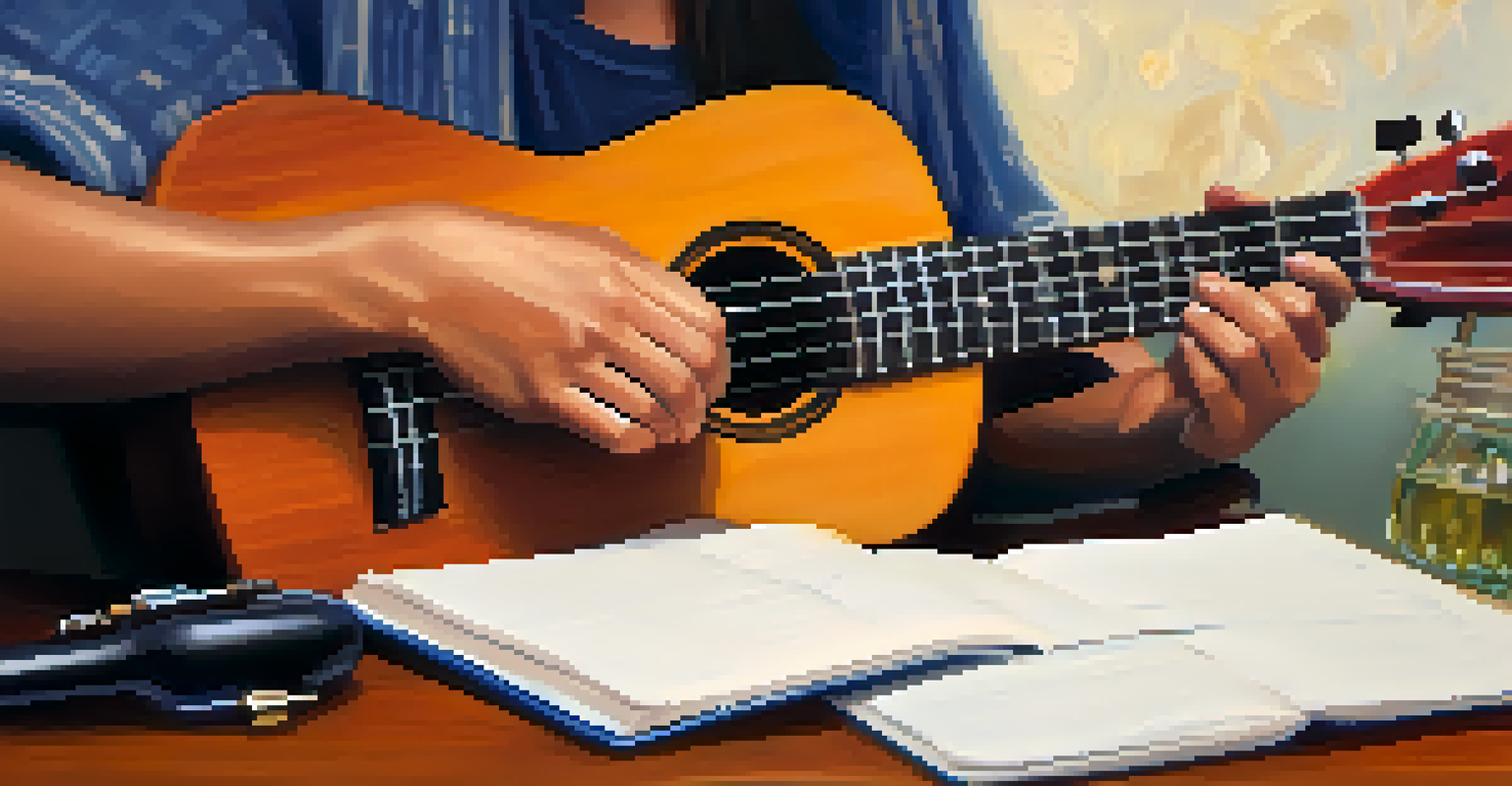Ukulele Therapy: Harnessing Music for Emotional Healing

Understanding Ukulele Therapy and Its Benefits
Ukulele therapy is a creative approach that combines music and emotional healing. It utilizes the soothing sounds of the ukulele to help individuals express their feelings and find solace. This method is particularly effective for those dealing with stress, anxiety, or depression.
Music can change the world because it can change people.
In a session, participants may strum simple chords while focusing on their emotions, allowing the music to resonate with their inner experiences. The act of playing can help release pent-up feelings, making it a powerful outlet for emotional expression. As they engage with the instrument, many find a sense of calm and clarity emerging.
Research has shown that engaging in music therapy can lower cortisol levels, which are often elevated during times of stress. The ukulele, being light and easy to learn, makes music therapy accessible to everyone, regardless of their musical background. This makes it an inviting option for those seeking emotional relief.
The Science Behind Music and Healing
Music has a profound impact on our emotions and brain chemistry. Studies suggest that listening to or playing music can trigger the release of dopamine, the 'feel-good' neurotransmitter, which enhances mood. This biological response is why music therapy, including ukulele therapy, can be so effective in emotional healing.

When we engage with music, our brain processes various rhythms and melodies, which can activate different areas associated with emotion and memory. This connection provides a unique way to explore and express feelings that might be difficult to articulate in words. The ukulele, with its cheerful tones, often encourages a light-hearted approach to serious issues.
Ukulele Therapy Enhances Emotional Healing
This creative approach uses the soothing sounds of the ukulele to help individuals express their feelings and find solace.
Furthermore, participating in a communal music experience, like a ukulele group, fosters social connections and support. These interactions can alleviate feelings of isolation, making the healing process feel more manageable. It's this blend of science and social interaction that makes ukulele therapy a holistic form of emotional healing.
How to Get Started with Ukulele Therapy
Getting started with ukulele therapy is easier than you might think. All you need is a ukulele, which is often more affordable than other instruments, and a willingness to explore your emotions through music. Many local community centers or online platforms offer classes specifically designed for beginners.
The music is not in the notes, but in the silence between.
Once you have your ukulele, start by learning a few simple chords. There are countless online tutorials and resources available, making it fun and easy to begin your journey. As you practice, allow yourself to play whatever feels right, whether it’s strumming along to your favorite songs or creating your own melodies.
Consider joining a ukulele group or class, where you can share your experiences with others. This communal aspect not only enhances your skills but also provides a supportive environment where everyone is on a similar journey. Remember, the goal is not perfection but emotional exploration and connection.
Personal Stories: Ukulele Therapy in Action
Many individuals have shared transformative experiences through ukulele therapy. For instance, a young woman named Sarah found that playing the ukulele after a tough breakup helped her process her emotions. Strumming away her heartache became a form of therapy, allowing her to express feelings she hadn’t been able to voice.
Another story comes from a retired veteran who turned to music as a way to cope with anxiety and PTSD. He discovered that the gentle sound of the ukulele provided a calming effect, helping him navigate his emotions. Each session allowed him to reflect on his experiences while fostering a sense of peace.
Community Strengthens Healing Process
Being part of a ukulele group fosters a sense of belonging, encouraging emotional expression and creating supportive connections.
These personal anecdotes highlight the versatility of ukulele therapy. Whether for stress relief, emotional expression, or social connection, many have found solace in the simplicity of this charming instrument. It’s a reminder that healing can come in many forms and that music often plays a vital role.
The Role of Community in Ukulele Therapy
Community plays a significant role in the effectiveness of ukulele therapy. Being part of a group fosters a sense of belonging, which is crucial for emotional healing. When individuals come together to share music, they create a supportive environment where everyone can express themselves freely.
In community settings, participants often share their struggles and triumphs, fostering deeper connections. This shared experience can normalize feelings of distress and anxiety, reminding everyone that they are not alone. The ukulele becomes a bridge that connects individuals through their shared journeys.
Moreover, the collaborative nature of group music-making encourages creativity and spontaneity. Participants can experiment with different sounds and styles, further enhancing their emotional expression. Ultimately, the bond formed through ukulele therapy can lead to lasting friendships and support systems.
Ukulele Therapy: A Tool for Mental Health Professionals
Mental health professionals increasingly recognize the benefits of incorporating music therapy into their practices. Ukulele therapy, in particular, offers a unique way to engage clients, especially those who may be hesitant to express themselves verbally. The friendly nature of the ukulele encourages openness and participation.
Therapists may use the instrument to help clients explore their emotions, whether through songwriting or improvisation. This hands-on approach often leads to breakthroughs that traditional talk therapy might not achieve. The ukulele's playful sound can lighten the mood, making it easier for clients to confront difficult feelings.
Accessible Music Therapy for All
The ukulele's simplicity and affordability make it an inviting option for anyone seeking emotional relief through music.
Furthermore, as therapists model playing and creating music, they demonstrate vulnerability, which can inspire clients to do the same. This reciprocal relationship fosters trust and safety in the therapeutic space, ultimately enhancing the healing process. Ukulele therapy thus serves as a valuable tool for mental health professionals.
Embracing Ukulele Therapy: Your Next Steps
If you’re intrigued by the idea of ukulele therapy, it's time to take the leap. Start by acquiring a ukulele and exploring online resources or local classes. With just a few chords, you can begin your journey toward emotional healing through music, regardless of your skill level.
Consider setting aside regular time for practice, treating it as a form of self-care. Just 15-30 minutes a day can make a significant difference in your emotional well-being. As you get more comfortable, try writing your own songs or jamming with friends to deepen your connection with the music.

Lastly, remember that the process is personal and unique to each individual. Embrace the journey, celebrate your progress, and allow the music to guide you toward emotional healing. Ukulele therapy might just be the refreshing breath of creativity that your mental health needs.